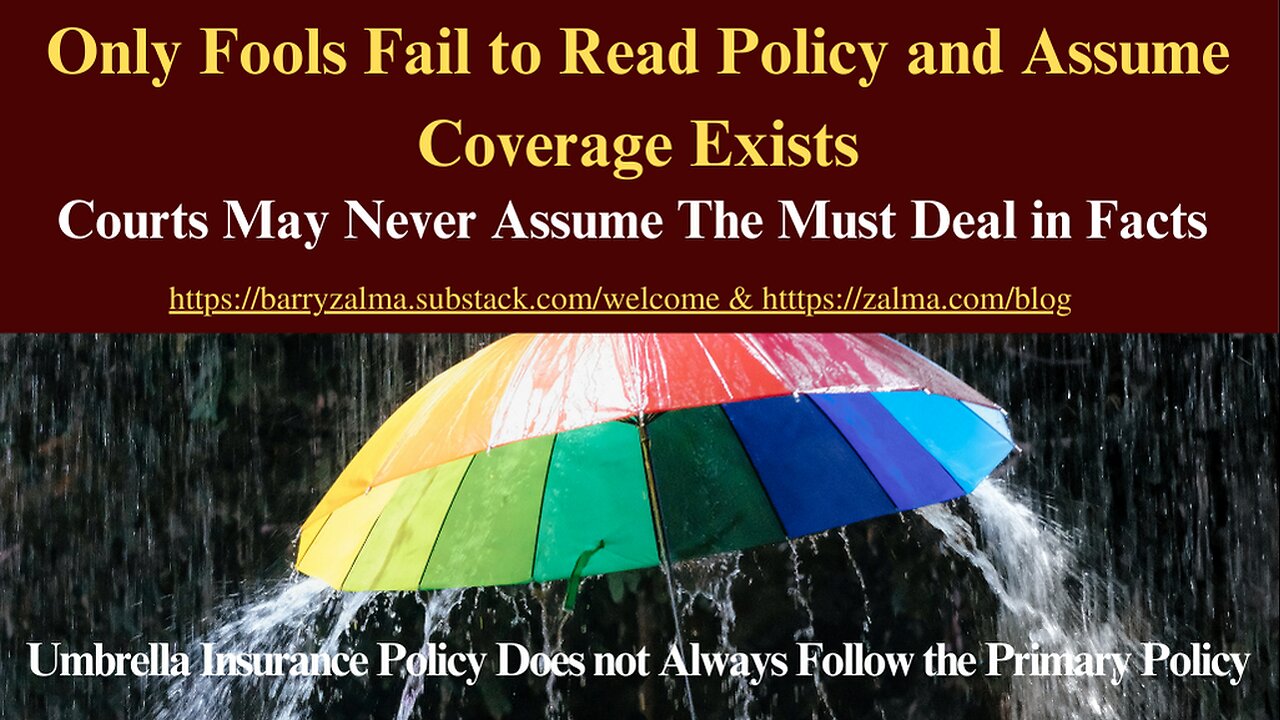Premium Only Content

Only Fools Fail to Read Policy and Assume Coverage Exists
Courts May Never Assume They Must Deal in Facts
Grange Insurance Company ("Grange") issued two insurance policies for insureds called Roosters - a Business Owners' Policy ("BOP"), and a Commercial Umbrella Policy ("CUP"). All agree the BOP provides coverage. The BOP specifically covered liquor liability the CUP specifically excluded liquor Liability.
In Grange Insurance Company v. Georgetown Chicken Coop, LLC; Anthony Crish; Chad Givens; Cock-A-Doodle-Doo, LLC; Preston Restaurant "A," LLC; and Robert Gauthier all aka "Roosters", No. 2022-CA-0101-MR, Court of Appeals of Kentucky (October 20, 2023) the Court of Appeal read the full CUP and ruled on its unambiguous language.
FACTUAL BACKGROUND
On the night of January 5, 2019, Joey Lee Bailey ("Bailey"), was served and consumed alcohol at Roosters in Georgetown. After leaving Roosters, Bailey went to another place called "Horseshoes" in Lexington, where Bailey continued to drink. Then, during the early morning hours of January 6, 2019, Bailey was driving the wrong direction on Interstate 75. Bailey's truck hit a vehicle carrying the five-member Abbas family. All six people were killed.
The estates sued. Roosters then sued for declaratory judgment against their insurer, Grange. Grange then sought a legal determination concerning their insurance coverage under the CUP. Roosters sought summary judgment, which was granted. Grange appealed.
ANALYSIS
Even if a court finds an ambiguity in a policy courts may not rewrite the plain language of a policy examined as a whole. The circuit court declared an ambiguity. The circuit found an ambiguity and also made a general observation about umbrella policies.
The difficulty with the decision of the circuit court flowed from the following paragraph in the circuit court's Conclusions of Law: “There is no purpose for an umbrella policy if not to supplement the underlying policy if exhausted.” What it ignored was that the purpose is only to supplement underlying policy coverages that the insurer agreed to supplement. The CUP was not a "follow form" umbrella and had different terms and conditions.
The primary insurance for Roosters was provided by Grange with the BOP. Liquor liability coverage was provided by an endorsement to the BOP. The parties agreed that liquor liability coverage existed in the BOP. Roosters also purchased the CUP, an umbrella policy with Grange. Umbrella policies are often purchased but, as in a real-life thunderstorm, some umbrellas provide more coverage than others. The Court of Appeals noted that your feet may still get wet with the best umbrella.
As a general statement, umbrella policies, as one form of excess coverage, follow the primary policy and provide additional coverage. Such policies often provide additional coverage for some claims not in the primary policy. An umbrella is not necessarily a mirror image of the primary coverage. An umbrella policy may have its own exclusions. The Court of Appeal stated that it was unable to find authority for the proposition that an umbrella cannot exclude additional coverage for certain claims covered by a primary policy since they are two separate contracts. That is why the first paragraph of the CUP states: "Various provisions in this policy restrict coverage. Read the entire policy carefully to determine rights, duties and what is and is not covered."
The word replace is not technical. The entire section in the form policy was removed and replaced by the language of the endorsement that eliminated liquor liability coverage. Without ambiguity, the expectations of the insured do not control.
Courts are not in the business of assumptions. Rather, a court must apply facts to the law.
Refusing to acknowledge and accept the Circuit Court's assumptions that an umbrella policy must provide coverage excess over all of the coverages provided by the BOP, the Court of Appeal reversed the trial court. The Court of Appeals directed a declaratory judgment that the CUP does not provide coverage and thus also does not impose a duty under the CUP to defend the claims in this case.
ZALMA OPINION
Whenever an insured or a court assumes facts or coverages exist without applying the actual language of the policy they must break the word "assume" into its component parts and Roosters and the trial court's assumption of coverage made an ass out of the insured and the circuit court. Although few actually read an insurance policy that is no excuse for any insured who did not pay someone to read it for them if they were unable to do it personally. The Court of Appeal had no choice, it read the policy and applied it as written.
(c) 2023 Barry Zalma & ClaimSchool, Inc.
Please tell your friends and colleagues about this blog and the videos and let them subscribe to the blog and the videos.
Subscribe to Excellence in Claims Handling at locals.com at https://zalmaoninsurance.locals.com/subscribe or at substack at https://barryzalma.substack.com/publish/post/107007808
Go to Newsbreak.com https://www.newsbreak.com/@c/1653419?s=01
Follow me on LinkedIn: www.linkedin.com/comm/mynetwork/discovery-see-all?usecase=PEOPLE_FOLLOWS&followMember=barry-zalma-esq-cfe-a6b5257
Daily articles are published at https://zalma.substack.com. Go to the podcast Zalma On Insurance at https://podcasters.spotify.com/pod/show/barry-zalma/support; Go to Barry Zalma videos at Rumble.com at https://rumble.com/c/c-262921; Go to Barry Zalma on YouTube- https://www.youtube.com/channel/UCysiZklEtxZsSF9DfC0Expg; Go to the Insurance Claims Library – http://zalma.com/blog/insurance-claims-l
-
 13:02
13:02
Barry Zalma, Inc. on Insurance Law
1 year agoMurder Pays
3481 -
 1:00:03
1:00:03
Sarah Westall
1 hour agoWeaponized Chaos – Worst in Modern History; Changing Geopolitical Landscape w/ Andy Schectman
2.43K1 -
 LIVE
LIVE
SpartakusLIVE
2 hours ago#1 Hacker/Scammer PLUNGES into CRYPTO || !crypto !spartacoin
223 watching -
 53:15
53:15
Kimberly Guilfoyle
5 hours agoCalifornia Residents Demand Answers, Live with Rep Vince Fong, Mike Davis, and Paul Peterson | Ep. 188
40.8K56 -
 1:49:51
1:49:51
Redacted News
5 hours agoEMERGENCY! 10 MILLION UNDER FIRE WARNING & 100 MPH WINDS, NEWSOM UNVEILS CALIFORNIA 2.0 PLAN
125K174 -
 49:33
49:33
Candace Show Podcast
4 hours agoI Respond To Mr. And Mr. Macron | Candace Ep 131
99.6K276 -
 1:58:04
1:58:04
Revenge of the Cis
6 hours agoEpisode 1429: Catch And Release
37.4K8 -
 2:00:01
2:00:01
Film Threat
10 hours agoVERSUS: HOLLYWOOD IS STILL ON FIRE | Film Threat Versus
22K1 -
 12:33
12:33
Silver Dragons
5 hours agoSilver Price Crushed Today - NEW TREND STARTING?
20.2K2 -
 1:02:03
1:02:03
In The Litter Box w/ Jewels & Catturd
23 hours agoRecall Newscum & Bass! | In the Litter Box w/ Jewels & Catturd – Ep. 718 – 1/13/2025
97.2K36